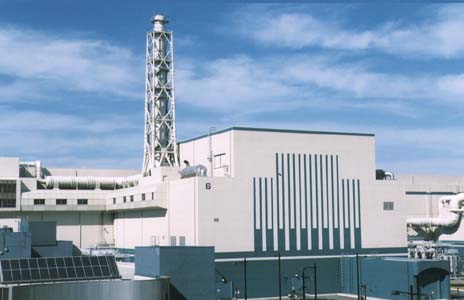
FOR
IMMEDIATE RELEASE
Sunday, May 27, 2001
CONTACT:
Paul Leventhal
202-822-6623 (o); 301-657-8171 (h)
Pleventhal@aol.com
JAPANESE
VILLAGE SENDS
LOUD MESSAGE ON PLUTONIUM
THAT BUSH AND CHENEY
WOULD DO WELL TO HEAR

"Thanks but no thanks." Tokyo Electric's Kashiwazaki-Kariwa Unit 3
nuclear power plant, where plutonium MOX fuel was going
to be introduced until local villagers said no.
WashingtonThe Nuclear Control Institute (NCI) today hailed the results of a referendum in which nearly 60 percent of the residents of a Japanese village said no to the proposed use of plutonium, a highly toxic atom-bomb material, as fuel in their local nuclear power plant.
The vote represents a major setback for the Japanese nuclear industry,
which waged an all-out campaign to convince the 4,000 inhabitants of Kariwa
Village to accept this controversial fuel and clear the way for its introduction
into electricity- generating reactors throughout Japan. Japanese utilities are
on record as saying they wont proceed with plutonium fuel without local
approval, and the program is now frozen in Niigata, Fukushima and Fukui
prefectures where the first reactors selected for use of plutonium fuel are
located.
NCI President Paul Leventhal said the reverberations of this vote will
be felt outside Japan, especially in Britain and France, the principal suppliers
of plutonium to Japan, and in the United States, where the Bush Administration
is weighing the reversal of a 25-year policy against plutonium use.
The Kariwa vote should be the turning point for the demise of the
Japanese and European plutonium industries, Leventhal said.
And it will help discredit the Bush-Cheney claim that these industries
set an example the United States should follow.
The 4,092 registered voters of Kariwa were asked whether they wanted the
plutonium fuel program stopped, suspended or approved.
Voter turnout for the referendum was almost 90%.
The results were 53.6% to stop the plutonium program,
3.7% to suspend it, and 42.7% to approve it. Thus, 57% of those voting, and more than half the total
electorate, opposed proceeding with plutonium fuel.
The Bush Administration would be wise to pay attention to the
villagers of Kariwa, Leventhal said. People
dont want nuclear plants that are fueled with atom bomb material that can be
seized by terrorists. And they
dont want a fuel that is so toxic that it will kill 100% more people in a
severe accident than if the reactor is fueled with conventional uranium.
The Bush Administration is now being pressed by nuclear industry
lobbyists and their supporters on Capitol Hill to reverse the decisions against
reprocessing of spent reactor fuel and recovery of plutonium made in the Ford,
Carter and Reagan Administrations. They
are urging the Administration to follow the European and Japanese example of
combining the recovered plutonium with uranium to make so-called
mixed-oxide (MOX) fuel for use in reactors.
The Kariwa referendum is but the latest evidence that the plutonium
industries in Japan and Europe are being rejected because they make no economic
sense, increase the consequences of a nuclear accident, and invite the further
spread of nuclear weapons to nations and terrorists, Leventhal said.